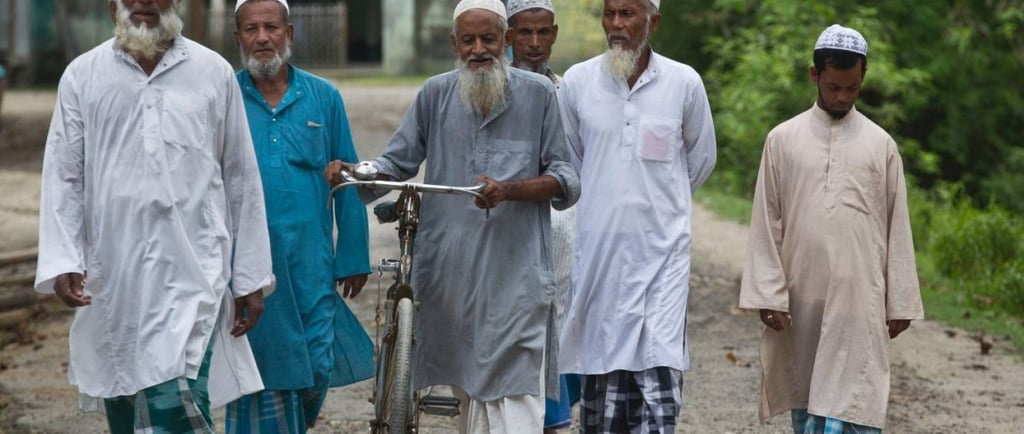Illegal Bangladeshis in Assam: Current Challenges and Emerging Security Threats in the Northeast
The issue of illegal immigration from Bangladesh into Assam and Northeast India has been a longstanding concern, particularly involving the Miya community, which refers to Bengali-speaking Muslims of Bangladeshi origin.
DIGICULT


Illegal Bangladeshis in Assam: Current Challenges and Emerging Security Threats in the Northeast
The issue of illegal immigration from Bangladesh into Assam and Northeast India has been a longstanding concern, particularly involving the Miya community, which refers to Bengali-speaking Muslims of Bangladeshi origin. While migration dates back to colonial times, post-1971 influxes have intensified debates over security. These immigrants, often entering undocumented through porous borders, are perceived as threats to demographic stability, cultural identity, resource allocation, and national security in the region. The Assam government, under Chief Minister Himanta Biswa Sarma, has ramped up evictions and pushbacks since 2024, framing it as a crackdown on "infiltrators." However, human rights groups argue these actions involve discrimination and unlawful deportations, highlighting a tension between security imperatives and humanitarian considerations. This note examines current and prospective security problems, drawing from diverse sources including Indian media, international reports, and regional discussions.
Demographic Changes and Cultural Erosion
Illegal Bangladeshi immigrants have significantly altered the population dynamics in Assam and neighboring states like Tripura and Manipur. In Assam, the Miya community is accused of encroaching on indigenous lands, leading to fears of cultural dilution among Assamese and tribal groups. For instance, evictions in districts like Morigaon and Goalpara have targeted suspected immigrants settling on forest lands, with over 1,500 families displaced in 2024 alone. In Tripura, indigenous communities have already become minorities due to similar influxes, serving as a cautionary example for the Northeast. This has fueled separatist sentiments, as seen in historical movements like the Assam agitation, where immigration was linked to over 12,000 deaths in conflicts.
Resource Strain and Economic Competition
The presence of undocumented migrants exacerbates competition for jobs, land, and public services. In Assam, illegal settlements on agricultural and forest lands have led to environmental degradation and economic losses for locals. Reports indicate that poverty and unemployment in Bangladesh drive this migration, but it burdens India's infrastructure, with estimates of 10-20 million undocumented Bangladeshis nationwide. In Northeast states, this has sparked protests and demands for deportation, as migrants are seen as undercutting wages in sectors like construction and farming.
Communal Tensions and Violence
Tensions between indigenous populations and the Miya community have resulted in sporadic violence. In 2025, eviction drives in Goalpara led to police firing, killing two individuals claimed to be in self-defense, amid accusations of state-sponsored targeting of Muslims. Human rights organizations report increased hate speech and evictions linked to Islamophobic politics, with over 330 pushbacks to Bangladesh in recent months. Cases of Indian citizens being mistakenly deported highlight procedural flaws, fueling resentment and potential backlash.
Border Insecurity and Infiltration
The 4,097 km India-Bangladesh border, with 262 km in Assam, remains porous, facilitating illegal entry. In 2025, Assam police pushed back over 2,500 suspected infiltrators, including in operations like "Operation Sindoor." This vulnerability is exploited for smuggling, with links to drugs and arms trafficking in Manipur and other states. Regional discussions emphasize how unchecked immigration threatens forest reserves and indigenous rights.
Links to Terrorism and Insurgency
Some migrants are alleged to have ties to insurgent groups or external threats. Historical reports connect illegal immigration to ISI activities aimed at destabilizing the Northeast. In 2024-2025, groups like ULFA-I have exploited border chaos from Bangladesh and Myanmar for bomb threats and recruitment. The presence of Rohingya refugees adds complexity, with fears of radicalization.
Potential for Demographic Majority Shifts
If current trends continue, Bangladeshi-origin populations could outnumber indigenous groups in Assam and parts of the Northeast by mid-century, leading to political marginalization. This mirrors Tripura's experience and could extend to states like West Bengal and Bihar, eroding cultural identities and sparking secessionist demands.
Escalation of Communal and Insurgent Conflicts
Intensified deportations risk retaliatory violence or insurgent alliances. Chaos in Bangladesh could drive more influxes, overwhelming border forces and fueling groups like ULFA-I. A nationwide NRC might exacerbate this, potentially straining India-Bangladesh relations if mass deportations occur.
Regional and International Instability
Porous borders with Myanmar and Bangladesh heighten risks from external influences, such as Turkish-backed groups promoting immigration to alter demographics. This could destabilize the Siliguri Corridor, isolating the Northeast and weakening national defense against China. Human rights violations in deportations may invite international scrutiny, complicating diplomacy.
Economic and Environmental Vulnerabilities
Future strains on resources could lead to food insecurity and environmental damage from illegal encroachments. Combined with climate-induced migration from Bangladesh, this poses long-term threats to sustainable development in the region.
Conclusion
The security challenges from Bangladeshi illegal immigrants in Assam and Northeast India are multifaceted, blending immediate threats like violence and infiltration with long-term risks of demographic upheaval and regional instability. While measures like border fencing and deportations address some concerns, they must be balanced with fair verification processes to avoid human rights abuses. A holistic approach, involving bilateral talks with Bangladesh and community integration where citizenship is verified, is essential to safeguard the region's integrity without fostering division.
Ideagiri: Online platform for Education: Govt Colleges and Universities, Govt Jobs, Exams, Internships, Business, Finance, Technology, DigiCult and more - Ideagiri.com
Nocont@ideagiri.com
© 2025. All rights reserved.
